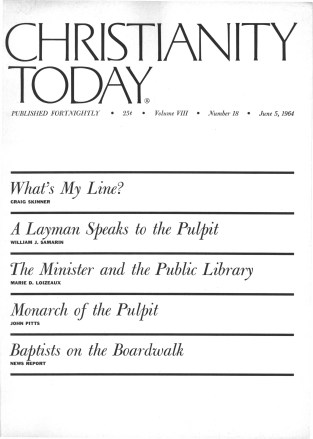Speaking is so important to us that we often tolerate an abundance of nonsense to get a few specks of substance. Yet our tolerance has limits, and he who questions, doubts, or wonders aloud whether what is said is worth saying, or said well, often exposes himself to censure.
I shall nonetheless raise my voice. Here in a public way, using an extension of the gift of language, I make my protest against the superficialities, the inanities, and the irrelevance of much that we must tolerate in preaching today.
This is not the first such protest. Others have expressed some of my own dismay at the state of Christian education, and perhaps some—such as those whose pastor “can’t preach” and whose Sunday school teachers “can’t teach”—have even more reason to despair than I.
For their sake, and partly for my own, I attempt this analysis of the crisis in Christian communication.
I write as a layman. This makes a difference. After twenty years of Christian service—as Sunday school teacher, youth director, assistant pastor, missionary—I now find myself “retired” to the benches. Week after week I make up part of the audience for whose benefit sincere preachers preach, dedicated teachers teach, and diligent writers write.
What are they telling me?
What they mean to tell me, of course, is what God has revealed in the Bible. They want me to know all the riches of God’s grace and to experience his power. They want me to demonstrate the fruit of the Spirit and be a living vessel of the Spirit of God.
To do all this they must use language.
Language is a strange and marvelous phenomenon. It is one of the most distinctly human characteristics. By it men interact and accomplish things that make them think they are gods. It is a tool that permits the formulation of profound and exquisite thoughts. It is the vehicle to sublimity.
The cost of sublimity is, however, inanity. To achieve the heights, we must tolerate the pedestrian. Like a trout swimming in the pool, we await the chance speck of nourishment. With a great tolerance, we wait for an instructive word or heart-touching challenge. All this is part of the human situation.
But we ask more than the stray blessing. The Church is an institution committed to the most efficient utilization of the faculties God gave to his children. We expect more from our prophets than a chance remark. Life is too short and they confront us too rarely for us to depend on a random blow to hit its mark in our souls.
The “schools of the prophets” abound in such great numbers that we justly expect more than we get. There are seminaries, Sunday school conferences, teacher-training programs—not to count the Sunday school quarterlies, monthly magazines, and other literature—that exist to assure us of our nourishment.
Famine In The Churches
Why then a “famine of the Word”—for there is indeed a famine. Will it take a “peasants’ revolt” to awaken the clergy to our predicament? Not all parts of the United States have the blessing of a few “good churches.” More common are the areas where one would have to drive for several hours, if not a day, to find a preacher who makes God talk to men in direct, authentic, and quotable sermons. Were it not for denominational loyalties, family traditions, and practical considerations too numerous to mention, many a preacher would certainly find himself with only a handful of the undiscriminating faithful.
There are, however, more discriminating laymen than one can imagine. They know when they are truly being fed. Why then are their voices not more often heard?
One reason is that in places that really count, they are not given the opportunity to speak. They cannot influence the teaching of homiletics or the writing of Christian literature. Only in the local church is there a possibility of contributing to better communication. They do, after all, participate in the selection of their church personnel.
A second reason is that too many laymen do not fully understand the nature of the problem that leaves them feeling so helpless and unhelped in their Christian experience. Everything sounds right, but very little hits hard. Unless they have deliberately visited many a church, of every shade of Protestantism, they know only what is characteristic of their own kind.
A third reason for the silence of laymen is that, without a carefully reasoned evaluation of the problem and without the high-level means of dealing with the fundamental issues, they must resort to only one means of response: the occasional demurrer in class or conversation. Taken seriously, these comments would have some impact; but they are ignored and even suppressed. Who would dare to tell the pastor that his sermon was poorly structured or that his statements were superficial or inaccurate? Such comments are interpreted as criticisms, as are comments made in the church class. True dialogue is unwelcome. Answers to questions—the expected answers, of course—are always sought; but questions from the class seem to challenge orthodoxy. This is why laymen feel intimidated.
The sheep, more discriminating than they are often given credit for being, are not responsible for the present situation. Why then this famine? Here is the answer, or part of the answer: too much evangelical preaching is irrelevant today because, although biblicistic, it fails to be truly and powerfully biblical.
From Texts To Themes
At the root of the problem, as I see it, is the arbitrary association of biblical texts with generalized propositions. (The use of the word “arbitrary” is important, as will soon be seen.) These propositions are the themes of the messages. Almost anything can be represented, of course; but as a matter of fact, the themes are somewhat predictable, once the age of the speaker, his denomination, and his theological training are known.
One Sunday school quarterly I once used for a seventh-grade class dealt with such subjects as: the study of God’s Word, the importance of following Christ, witnessing by word and life, daily cleansing from sin, times of testing in a Christian’s life, and the like (the reader can make his own list), all under the major theme of the Christian’s “walk.” (Sermons could just as easily have been used as an illustration, but the quarterly has the advantage of being anonymously written.)
These themes are unassailable. But because of their generality and their predictability, they have no punch. In linguistic terminology, these themes have no, or very little, “information.” (The sentences “This man sings” and “These men sing” mark number, singular or plural, three times. One could more efficiently say “This man sing” and “This men sing”; marking number two extra times has no information value.)
Because these themes are formulated in grammatical utterances, we unthinkingly assume that they are informative propositions. In actual fact, they are mere clichés. Some of them are like slogans; they hardly do more than arouse assent and group identification.
Other such formulations are ritualistic. Don’t we have a fairly good idea what the pastor is going to say at the sick-bed, or the prayer meeting, or the evangelistic meeting? It is less important, one feels, that he say something of value than that he say something. The moment demands speech, and the clergyman, equipped with a repertory of appropriate themes, is prepared for it.
Such a ministry is by no means shorn of scriptural allusions. Any message may be replete with documentation. The impression given, moreover, is that Scripture is the source of the propositions. This may be far from the truth. Rather than being derived from Scripture, the propositions have only the most tenuous relationship to Scripture. For this reason the relationship was described above as arbitrary.
When preachers reject logic for the questionable purpose of getting their point across, they do an injustice to the Word of God, insult the intelligence of the audience, and fail in what they sought to do. When I lose the train of thought, it isn’t just that my mind has wandered: I can’t see how the preacher got where he is from where he started.
Improvement in Christian communication can come, but it will come, first, only to the degree that truth is drawn from the Word of God. The problem is, of course, that such preaching—expository preaching—is impossible without profound understanding of the biblical text. It requires a depth of theological learning and a real sense of living and of being human that far too few spokesmen for Christianity have.
Secondly, improvement will come when communications are made with a keen sense of vulnerability. This is a characteristic that is absent from cliché-ridden, slogan-proclaiming, hortatory messages. When I agree with all my preacher has said, he has taught me nothing. True preaching (apart from some aspects of the declaration of the Gospel), like true teaching, engages the hearer in a dialogue. This dialogue involves the active investigation of a subject, “active” because two parties contribute. My part in the pew is to challenge the truthfulness and the appropriateness of what I am told. “Does it hold water? Does it ring a bell?” These are the tests of vulnerability.
There are preachers who shrink from exposing themselves. They make themselves invulnerable by taking up the armor of bombastic histrionics, obfuscating illogicality, and oft-strained, dogmatized tradition. Their voice cries out through the armor’s helmet—but it is muffled.
Only a few feet separate the pew from the pulpit. A muffled voice from the pulpit hardly spans even this small distance; unmuffled, it would ring out over space and through time unmeasured.
William J. Samarin, assistant professor of linguistics at the Hartford Seminary Foundation, holds the degrees of B.Th. (Biola) and B.A. and Ph.D. (University of California). He served as a missionary in the Central African Republic (1951–60) under the Brethren Church.










